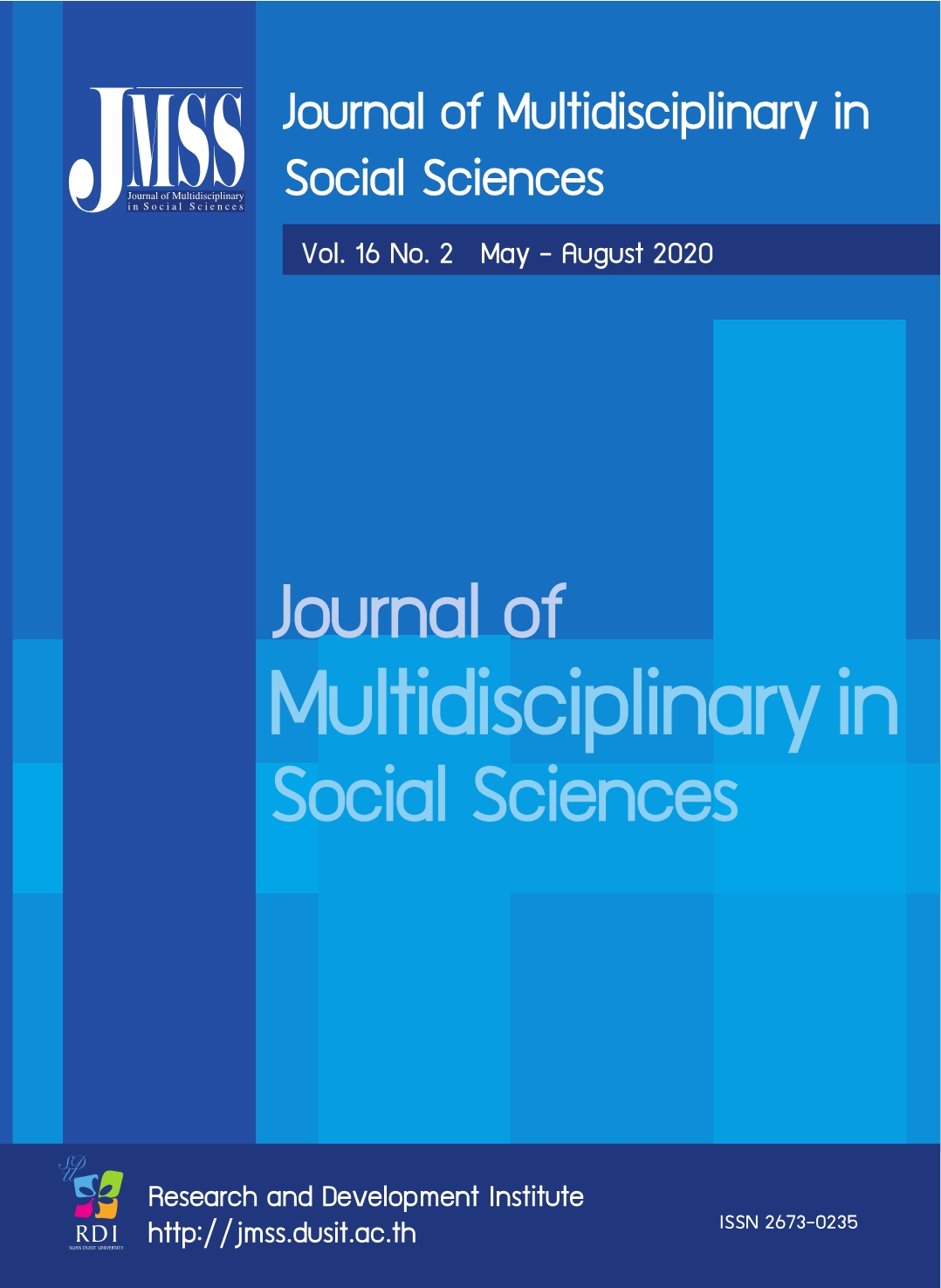Factors Affecting Chinese Tourists’ Pro-Environmental Intention to Stay at Eco-Friendly Hotels in Thailand
Keywords:
Eco-friendly hotels, Chinese hotel guests, Thailand, Proenvironmental intentionAbstract
The objective of this study was to examine the intentions of Chinese tourists that are related to staying at eco-friendly hotels in Thailand by employing a model combining the Theory of Planned Behavior and the Value-Belief-Norm Theory. In order to investigate the factors that influence the intention of Chinese hotel guests to stay in green hotels, a quantitative research approach was applied for this study with a questionnaire on the eco-friendly and conventional hotels in Bangkok, Nakon Nayok and Phuket completed by a sample of 436 Chinese hotel guests. The results indicate that their sense of obligation to take pro-environmentally friendly actions, attitude towards behavior, subjective norms, and perceived behavioral control have a significant influence on the intention of Chinese guests to stay in eco-friendly hotels while traveling in Thailand. With the use of pro-social and self-interest variables, the proposed model indicates a high level of prediction to the behavioral intention (R2 = 0.455). Recommendations are provided for government institutions in both countries to introduce educational programs to strengthen the environmental awareness of tourists from China and to facilitate the implementation and conducting of hotel operations that are based on the requirements of environmentally aware travelers by hotel managers at eco-friendly hotels in Thailand.
References
Anderson, J. C., & Gerbing, D. W. (1988). Structural equation modeling in practice: A review and recommended two - step approach. Psychological bulletin, 103(3), 411.
Bamberg, S. (2003). How does environmental concern influence specific environmentally related behaviors? A new answer to an old question. Journal of environmental psychology, 23(1), 21-32.
Bamberg, S., & Möser, G. (2007). Twenty years after Hines, Hungerford, and Tomera: A new meta-analysis of psycho-social determinants of pro-environmental behaviour. Journal of environmental psychology, 27(1), 14-25.
Belk, R. W. (1985). Issues in the intention-behavior discrepancy. Research in consumer behavior, 1(4), 1-34.
Bohdanowicz, P. (2005). European hoteliers’ environmental attitudes greening the business. Hotel & Restaurant Administration Quarterly, 46(2), 188-204.
Cerutti, A. K., Beccaro, G. L., Bruun, S., Donno, D., Bonvegna, L., & Bounous, G. (2016). Assessment methods for sustainable tourism declarations: the case of holiday farms. Journal of Cleaner Production, 111(B), 511-519.
Chen, M. F., & Tung, P. J. (2014). Developing an extended theory of planned behavior model to predict consumers’ intention to visit green hotels. International journal of hospitality management, 36, 221-230.
Chen, A., & Peng, N. S. (2014). Recommending green hotels to travel agencies’ customers. Annals of Tourism Research, 48, 284-289. https://doi.org/10.1016/j.annals.2014.07.003
Choi, H., Jang, J., & Kandampully, J. (2015). Application of the extended VBN theory to understand consumers’ decisions about green hotels. International Journal of Hospitality Management, 51, 87-95.
China Tourism Academy. (2018). “2017 China Outbound Tourism Travel Report”. Retrieved July 29, 2020, form http://www.ctaweb.org/html/2018- 2/2018-2-26-11-57-78366.html
Foster, G. D. (2001). China as great power: from red menace to green giant?. Communist and PostCommunist Studies, 34(2), 157-174.
Gao, J., Huang, Z., & Zhang, C. (2017). Tourists' perceptions of responsibility: an application of norm -activation theory. Journal of Sustainable Tourism, 25(2), 276-291.
George, D., & Mallery, P. (2003). SPSS for Windows step by step: A simple guide and reference. 11.0 update (4th ed.). Boston: Allyn & Bacon.
Hair, J. F., Black, W. C., Babin, B. J., Anderson, R. E., & Tatham, R. L. (1998). Multivariate data analysis. Upper Saddle River, NJ: Prentice hall.
Han, H. (2015). Travelers' pro-environmental behavior in a green lodging context: Converging valuebelief-norm theory and the theory of planned behavior. Tourism Management, 47, 164-177.
Harris, P. G. (2006). Environmental perspectives and behavior in China: Synopsis and bibliography. Environment And Behavior, 38(1), 5-21.
Hilton, I. (2013). China and The Environment: The Green Revolution. Zed Books Ltd. New York: Zed Books Ltd.
Lee, T. H., & Jan, F. H. (2018). Ecotourism behavior of nature-based tourists: An integrative framework. Journal of Travel Research, 57(6), 792-810.
Kim, Y., & Han, H. (2010). Intention to pay conventionalhotel prices at a green hotel–a modification of the theory of planned behavior. Journal of Sustainable Tourism, 18(8), 997-1014.
Liu, Y., Sheng, H., Mundorf, N., Redding, C., & Ye, Y. (2017). Integrating norm activation model and theory of planned behavior to understand sustainable transport behavior: Evidence from China. International journal of environmental research and public health, 14(12), 1593.
Ministry of Tourism & Sports. (2019). International Tourist Arrivals to Thailand 2019. Retrieved July 29, 2020, form https://www.mots.go.th/more_news_new.php?cid=527
Nimri, R., Patiar, A., Kensbock, S., & Jin, X. (2020). Consumers’ intention to stay in green hotel s in Australia: Theorization and implications. Journal of Hospitality & Tourism Research, 44(1), 149-168.
Van Riper, C. J., & Kyle, G. T. (2014). Understanding the internal processes of behavioral engagement in a national park: A latent variable path analysis of the value-belief-norm theory. Journal of Environmental Psychology, 38, 288-297.
Verma, V. K., & Chandra, B. (2018). An application of theory of planned behavior to predict young Indian consumers' green hotel visit intention. Journal of Cleaner Production, 172, 1152-1162.
Yadav, R., & Pathak, G. S. (2016). Young consumers' intention towards buying green products in a developing nation:Extending the theory of planned behavior. Journal of Cleaner Production, 135, 732-739.
Wang, J., Wang, S., Wang, Y., Li, J., & Zhao, D. (2018). Extending the theory of planned behavior to understand consumers’ intentions to visit green hotels in the Chinese context. International Journal of Contemporary Hospitality Management, 30(8), 2810-2825
Downloads
Published
How to Cite
Issue
Section
License

This work is licensed under a Creative Commons Attribution-NonCommercial-NoDerivatives 4.0 International License.








